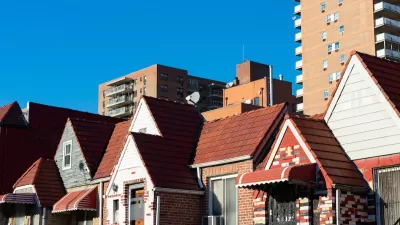Paul Krugman, one of the most influential voices of liberal policy in the United States, has identified a culprit in the U.S. affordability crisis: over-regulation.

Paul Krugman begins an op-ed that identifies land use regulations as the cause of the affordability crisis in urban America by establishing some historic context. "Specifically, urban America reached an inflection point around 15 years ago," writes Krugman, "after decades of decline, central cities began getting richer, more educated, and, yes, whiter. Today our urban cores are providing ever more amenities, but largely to a very affluent minority."
The big question of the op-ed, however, is why? And a second question: "is there any way to spread the benefits of our urban renaissance more widely?"
First, Krugman credits/blames the modern high-wage earner, willing to pay a premium to live closer to work and reduce commute times. " Hence gentrification," writes Krugman. "And this is a process that feeds on itself: as more high earners move into urban centers, these centers begin offering amenities: — restaurants, shopping, entertainment — that make them even more attractive."
Then, Krugman echoes the words of Jason Furman, the chairman of the White House Council of Economic Advisers, who recently began a public relations campaign, of sorts, about the effects of restrictive land use policies on housing supply and housing affordability.
"The good news is that this is an issue over which local governments have a lot of influence. New York City can’t do much if anything about soaring inequality of incomes, but it could do a lot to increase the supply of housing, and thereby ensure that the inward migration of the elite doesn’t drive out everyone else. And its current mayor understands that."
The conclusion of the article promises more on the subject of housing policy and what it will take to deliver on the supply that Krugman desires.
FULL STORY: Inequality and the City

Planetizen Federal Action Tracker
A weekly monitor of how Trump’s orders and actions are impacting planners and planning in America.

San Francisco's School District Spent $105M To Build Affordable Housing for Teachers — And That's Just the Beginning
SFUSD joins a growing list of school districts using their land holdings to address housing affordability challenges faced by their own employees.

The Tiny, Adorable $7,000 Car Turning Japan Onto EVs
The single seat Mibot charges from a regular plug as quickly as an iPad, and is about half the price of an average EV.

Seattle's Plan for Adopting Driverless Cars
Equity, safety, accessibility and affordability are front of mind as the city prepares for robotaxis and other autonomous vehicles.

As Trump Phases Out FEMA, Is It Time to Flee the Floodplains?
With less federal funding available for disaster relief efforts, the need to relocate at-risk communities is more urgent than ever.

With Protected Lanes, 460% More People Commute by Bike
For those needing more ammo, more data proving what we already knew is here.
Urban Design for Planners 1: Software Tools
This six-course series explores essential urban design concepts using open source software and equips planners with the tools they need to participate fully in the urban design process.
Planning for Universal Design
Learn the tools for implementing Universal Design in planning regulations.
Smith Gee Studio
City of Charlotte
City of Camden Redevelopment Agency
City of Astoria
Transportation Research & Education Center (TREC) at Portland State University
US High Speed Rail Association
City of Camden Redevelopment Agency
Municipality of Princeton (NJ)





























